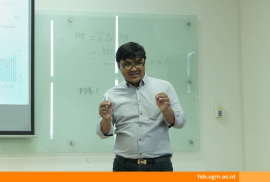FEB UGM economist, Artidiatun Adji, M.Ec., Ph.D., said that excise on packaged sweetened drinks (MBDK) is feasible to implement immediately in Indonesia.
“So far, an average of 95 percent of government excise revenue comes from tobacco (cigarette) revenues. Therefore, it is necessary to extensify excise, and MBDK is one of the appropriate commodities to be subject to excise,” he explained on Monday (24/3) at the FEB UGM Campus.
This lecturer at the Department of Economics, Faculty of Economics and Business, UGM, said that with the implementation of MBDK excise, hopefully, the government will no longer depend on excise revenue from tobacco products. Apart from that, the policy design also aims to implement excise, primarily to obtain state revenue and reduce consumption, which has the potential to impact health (excise as a sin tax).
According to him, implementing excise for MBDK is also appropriate to reduce excessive consumption of sugar or sweet drinks. In this way, implementing this excise can reduce the prevalence of diabetes in the country. The Ministry of Health website quotes data from the International Diabetes Federation (ID) reporting that as of 2021 there will be around 10.6 percent of the more than 179.72 million adult population aged 20-79 years in Indonesia suffer from MBDK diabetes in order to reduce the prevalence of diabetes in Indonesia.
He further explained that according to the Asia-Pacific Tax Forum, there are several criteria for goods subject to excise duty. In general, these are goods with the characteristics of luxury goods, namely goods consumed to show a person’s status or economic class, not for basic consumption (necessity). That is why this item was created and produced to gain attention.
The following characteristic is goods that will negatively impact if consumed, both for themselves and society. Examples of these goods are cigarettes and alcoholic drinks. Excise on these products is called sin tax.
The following characteristic is that the product is addictive; that is, the product consumed will give rise to an intense desire to consume repeatedly and create dependence. Examples of these products are cigarettes and alcoholic drinks.
Lastly, products are generally aimed at only some people (mass consumption) whose consumption is limited. These products usually have low elasticity.
“Based on the Asia Pacific Tax Forum and OECD classification, MBDK can also be categorized as a commodity whose consumption needs to be reduced,” he explained.
Artidiatun further said that excise should no longer be seen only as a sin tax, a fiscal instrument to control the external impact of consumption on health. However, excise taxes must also be seen as a comprehensive fiscal instrument. One example is to reduce the impact of excessive consumption on environmental damage, such as plastic and fuel oil consumption. Another example is applying user charges to public consumption of goods and services the government provides, such as road use, by applying fuel or motor vehicle excise. Then, to improve income distribution, cigarette excise funds should be allocated to finance government health insurance (BPJS).
“More importantly, as a fiscal instrument, excise can be an essential source of state revenue,” he said.
Impact on the Economy
Artidiatun said MBDK excise revenue would increase government excise revenue. In this way, the government’s dependence on excise revenue from tobacco products will be reduced.
“It is important to know the elasticity of demand for MBDK. The implementation of excise will reduce demand for MBDK, but the magnitude and significance need to be studied,” he said.
He explained that if demand for MBDK were elastic, then the percentage increase in prices due to the implementation of excise would be smaller than the decrease in demand for MBDK.
Meanwhile, if demand for MBDK is inelastic, then the percentage increase in prices due to the implementation of excise will be more significant than the decrease in demand for MBDK. The amount of lost welfare will be more significant if the demand for MBDK is elastic.
What about the amount of excise tax applied? Artidiatun conveyed that the application of excise on commodities with inelastic demand is based on rational economic arguments, resulting in low deadweight loss (DWL) or welfare loss (welfare costs). According to Ramsey (1927), tax or excise rates should be applied more to commodities with inelastic demand than commodities with elastic demand. This is assuming the elasticity of supply is constant or the same for both commodities. The level of tax or excise rates should be inversely proportional to the amount of elasticity. The level of tax or excise rates should be inversely proportional to the amount of elasticity. This condition is caused by the welfare costs arising from applying excise at the same rate, which is more significant for commodities with elastic demand than those with inelastic demand. Therefore, from an efficiency perspective, it is recommended that higher excise rates be applied to commodities with low elasticity.
Artidiatun explained that excise policy in Indonesia is based on four pillars. First, optimize state revenue. Second, reducing consumption of dangerous goods. Third, eradicating illegal products. Fourth, the protection of small businesses and employment opportunities.
“Therefore, it is also necessary to pay attention to the impact of implementing excise on MBDK produced by MSMEs. MBDK segmentation needs to be mapped for the application of excise rates on MBDK,” he concluded.
Reportage: Kurnia Ekaptiningrum
Foto: Freepik.com






